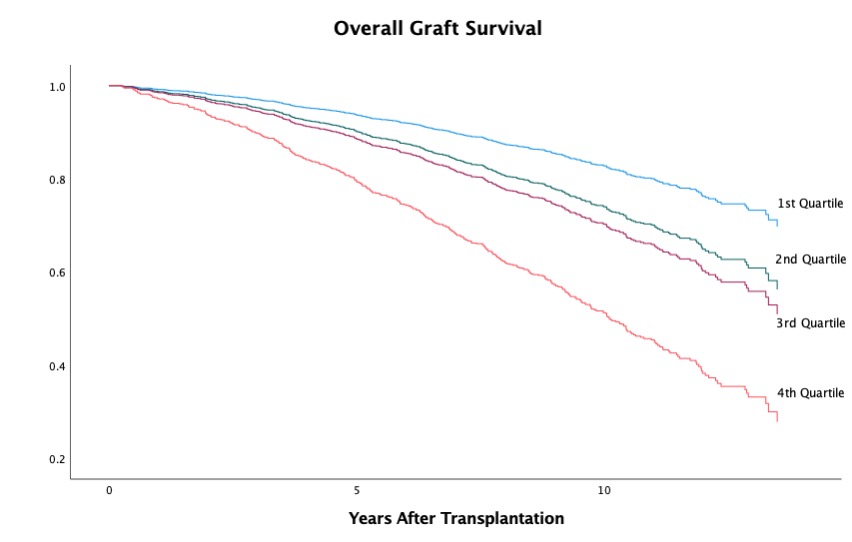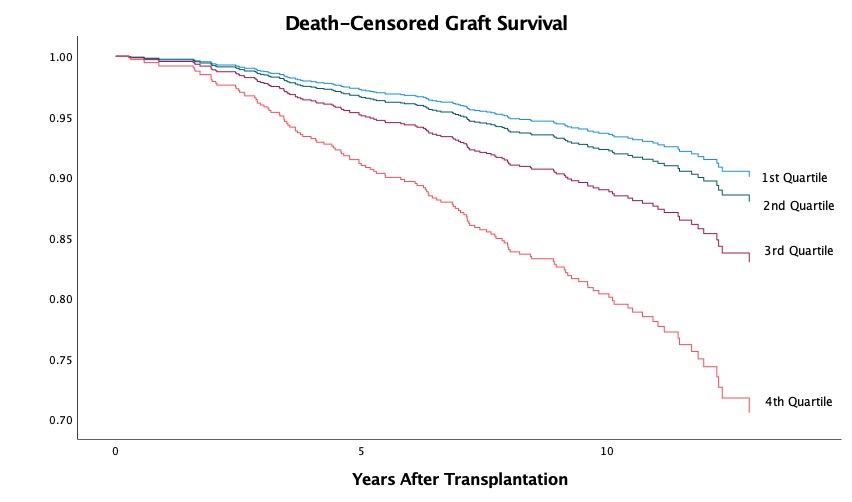Inflammation After Kidney Transplantation Is Associated With Overall- And Death-censored Graft Loss
Department of Transplantational Medicine, Oslo University Hospital, Rikshospitalet, Oslo, Norway
Meeting: 2022 American Transplant Congress
Abstract number: 9082
Keywords: Graft survival, Immunosuppression, Inflammation, Kidney transplantation
Topic: Basic Science » Basic Clinical Science » 17 - Biomarkers: Clinical Outcomes
Session Information
Session Name: Biomarkers: Clinical Outcomes
Session Type: Poster Abstract
Date: Tuesday, June 7, 2022
Session Time: 7:00pm-8:00pm
 Presentation Time: 7:00pm-8:00pm
Presentation Time: 7:00pm-8:00pm
Location: Hynes Halls C & D
*Purpose: Early graft loss after kidney transplantation (KT) is mainly a result of acute rejection, while long-term graft loss episodes are often dependent on multifactorial conditions. Both short- and long-term graft survival have improved in the last decade, however, the short-term results are still superior to the long-term outcomes. In this study we wanted to explore if patients with subclinical inflammation 10 weeks after KT had increased risk of long-term graft loss (GL).
*Methods: We measured 21 inflammatory biomarkers 10 weeks after KT in 1044 patients without any sign of acute inflammation and/or ongoing rejection episodes. Low-grade inflammation was assessed as composite inflammation scores: one overall inflammation score, and additionally five pathway-specific scores (table 1). The scores were tested in Cox regression models adjusted for traditional risk factors.
*Results: During the study period, 410 (39.3%) patients experienced overall GL, and of these 145 (35.6%) were death-censored GL. The overall inflammation score was significantly associated with overall GL (2nd quartile HR 1.60, p=0.001, 3rd quartile HR 1.87, p<0.001, 4th quartile HR 3.54, p<0.001), and with death-censored GL (2ndquartile HR 1.22, p= 0.504, 3rd quartile HR 1.78, p=0.049, 4th quartile HR 3.32, p<0.001) (figure 1 and 2). The same pattern was present for the pathway-specific scores and overall GL, whereas only fibrogenesis, vascular-, and metabolic inflammation showed a significant association with death-censored GL.
*Conclusions: It appears to be a strong association between subclinical general inflammation in the early period after KT and both long-term overall- and death-censored GL. These results establish the foundation for future studies on follow-up strategies and possibly new therapeutic approaches.
| Pathway-specific inflammationscores | HazardRatio (p-value) | ||
| 2nd Quartile | 3rd Quartile | 4th Quartile | |
| Fibrogenesis | 1.65 (p=0.008) | 1.75 (p=0.003) | 2.49 (p<0.001) |
| Vascular inflammation | 1.10 (p=0.580) | 1.85 (p<0.001) | 2.38 (p<0.001) |
| Metabolic inflammation | 1.60 (p=0.004) | 1.45 (p=0.023) | 1.89 (p<0.001) |
| Angiogenesis | 1.35 (p=0.038) | 1.07 (p=0.652) | 1.31 (p=0.080) |
| Leukocyte activation | 1.19 (p=0.267) | 1.41 (p=0.028) | 1.71 (p<0.001) |
To cite this abstract in AMA style:
Heldal TF, Jenssen T, Hartmann A, Heldal K, Asberg A. Inflammation After Kidney Transplantation Is Associated With Overall- And Death-censored Graft Loss [abstract]. Am J Transplant. 2022; 22 (suppl 3). https://atcmeetingabstracts.com/abstract/inflammation-after-kidney-transplantation-is-associated-with-overall-and-death-censored-graft-loss/. Accessed February 21, 2026.« Back to 2022 American Transplant Congress


